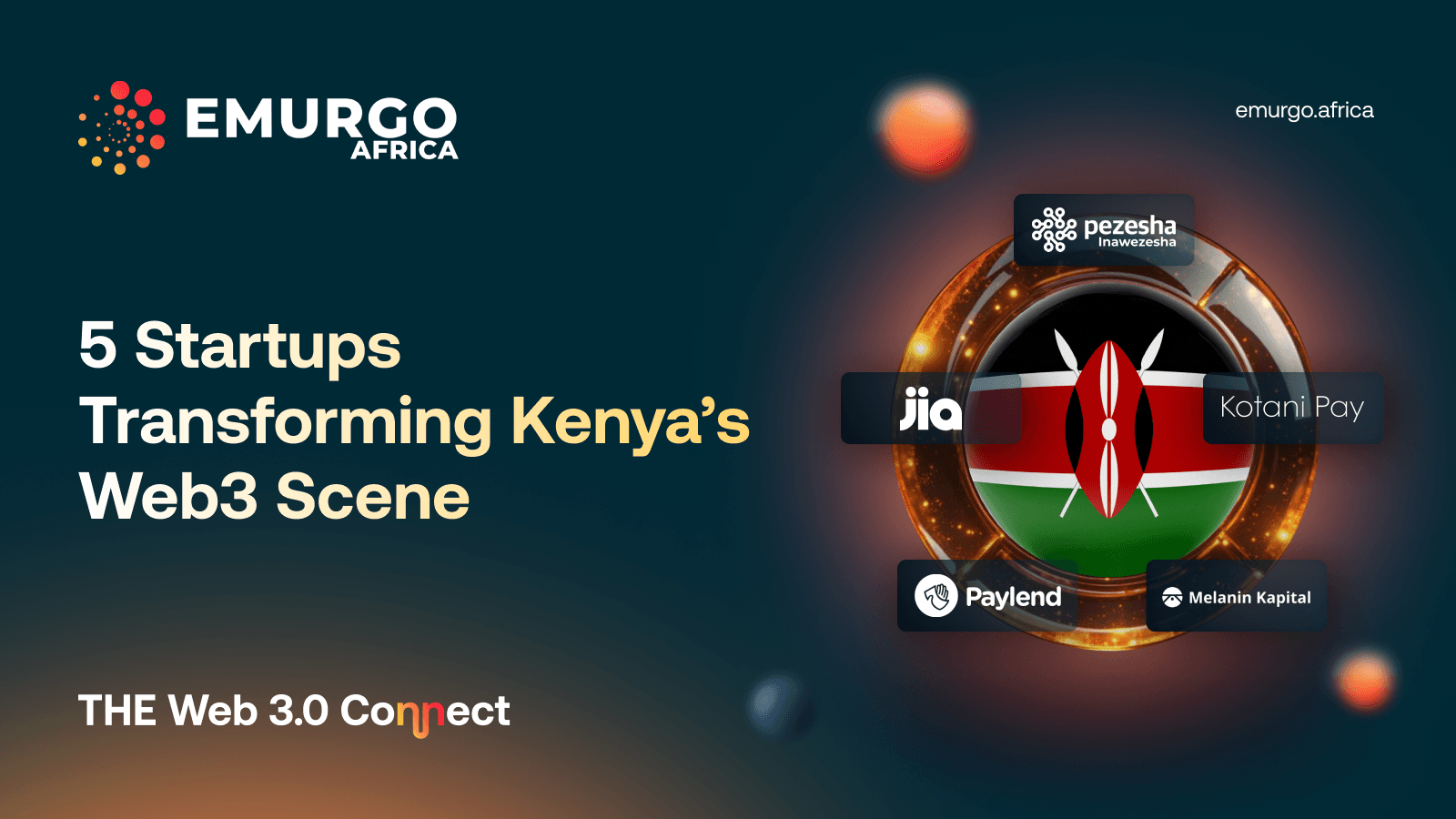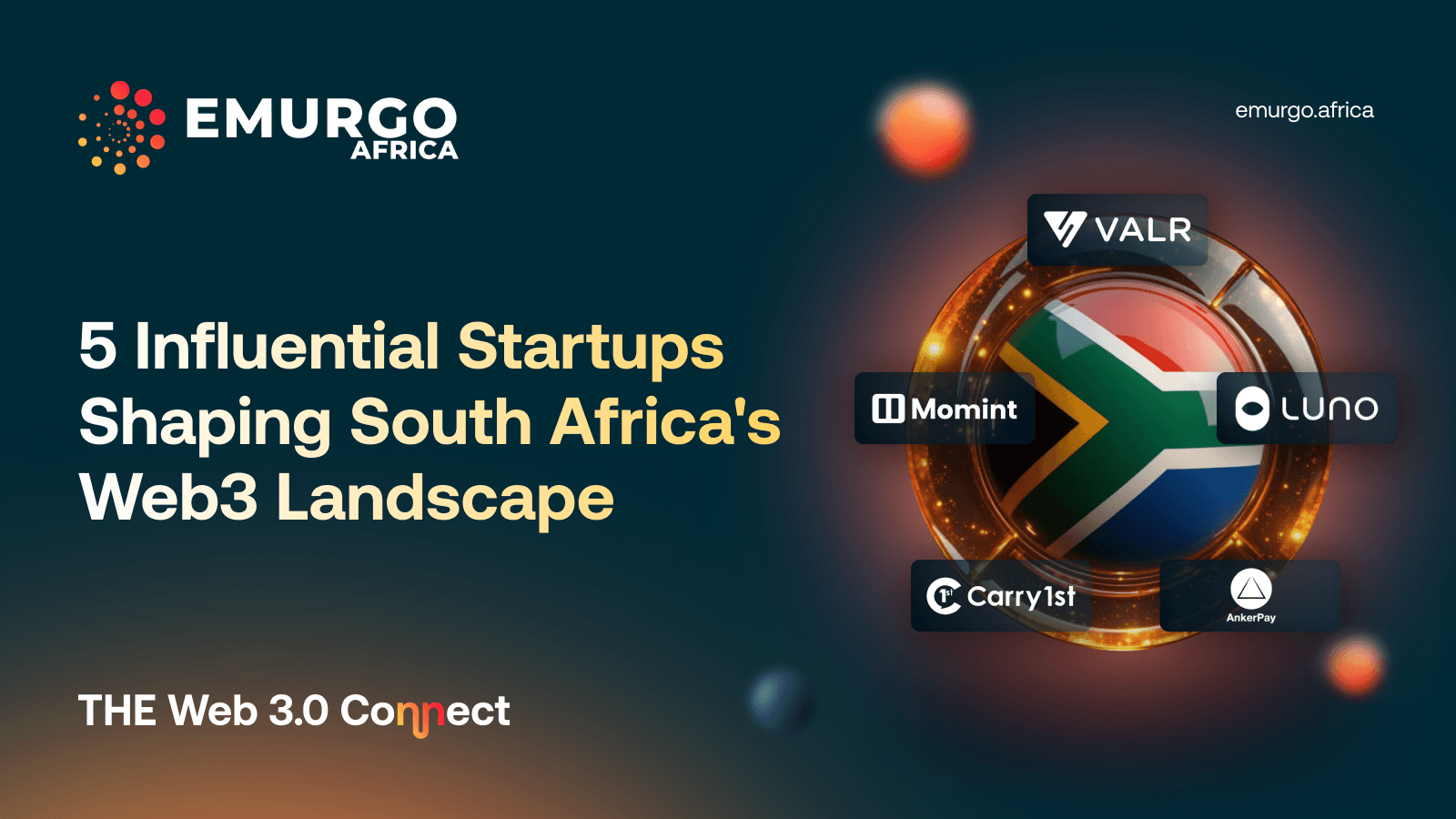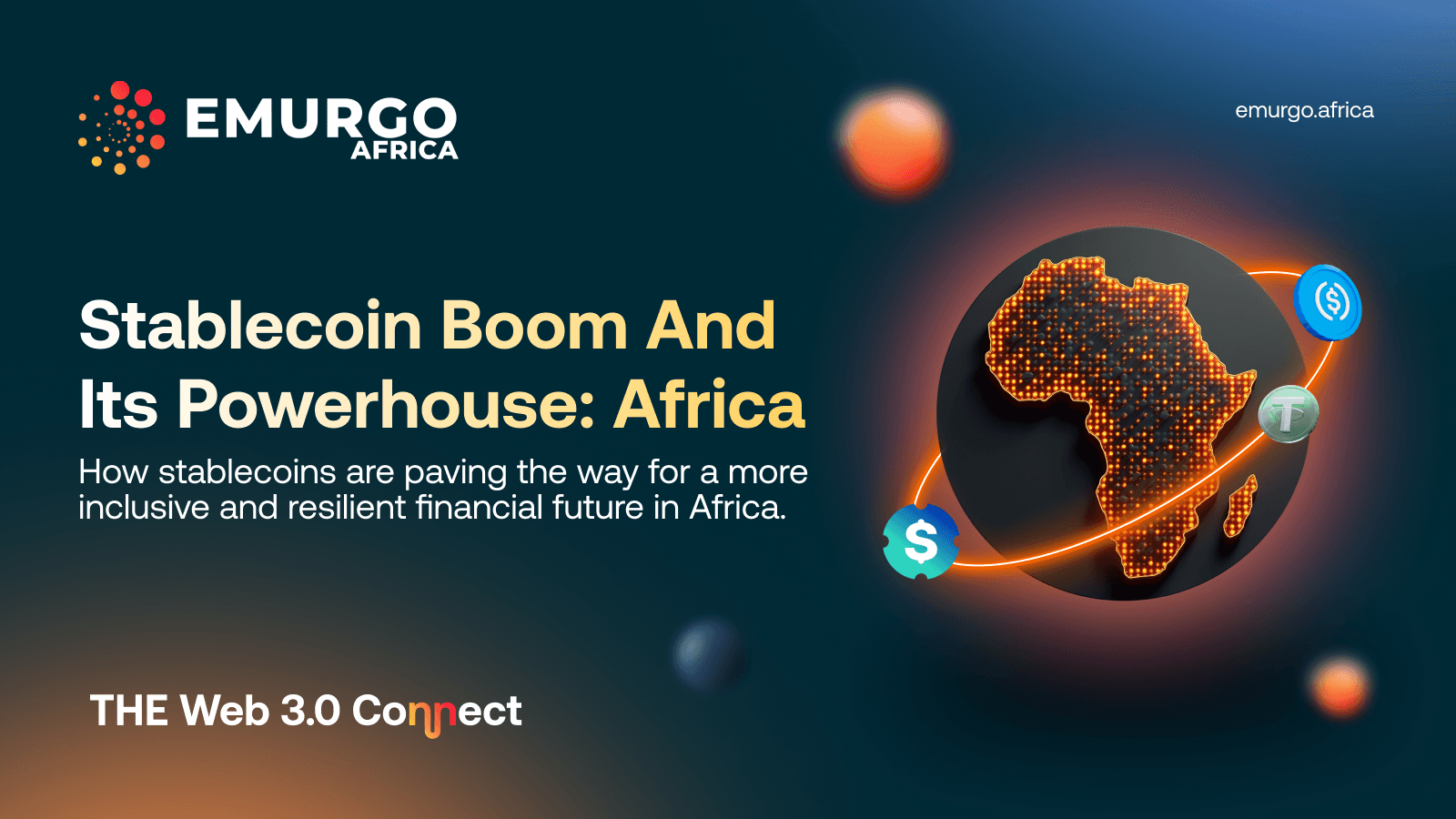By Shogo Ishida, Yosuke Yoshida Co-CEOs, EMURGO Africa
Financially-developing Nigeria's Web3 market is simmering with exciting possibilities, and the recent funding landscape reflects a clear focus on decentralized finance (DeFi), neobanks and crypto exchanges. This trend highlights the country's long-standing entrepreneurial spirit to build a digital financial system that’s leading to a leap-frog growth of Nigeria.
Nigerian startups have raised $469 million through equity-funding in 2023, according to Partech’s January 2024 report. Of this, roughly 35% of the fund has gone to fintechs.
Looking forward, in the country’s blockchain-native fintech startup ecosystem, DeFi and peer-to-peer payment solutions are expected to attract venture capitalists in the continent, while the exchange businesses are likely to gain a wider user-base.
Key Takeaways
- Crypto exchanges, DeFi and neobanks are the most-funded Web3 startups that are shaping Nigeria’s blockchain-based financial system to offer basic banking services to its people.
- DeFi and Neobanks play a vital role to offer more financial products to unbanked and underbanked Nigerians.
- Even in the Web1 or Web2 spaces, fintechs command the biggest VC money in Nigeria’s financial inclusion push.
- Crypto exchanges, DeFi and Neobanks are the Most-funded Web3 Startups in Nigeria
Looking at funding by blockchain-based startups over the past three years in Nigeria, investors are highly expecting a growth in crypto exchanges, DeFi, and digital banks. As the sector matures and regulatory frameworks become clearer, we can expect further innovation and wider adoption. But here are the startups already transforming the financial landscape for millions of Nigerians:
i) Yellow Card ($56.5 million raised in total)
Yellow Card, founded in 2019, and headquartered in Georgia, the U.S., has rapidly become a force to be reckoned with in the Nigerian cryptocurrency landscape. Its journey as a leading crypto exchange has been marked by impressive growth, strategic expansion, and a relentless focus on financial inclusion for the continent.
Starting off in Lagos, Yellow Card has exploded across Africa, boasting over 1.7 million registered customers as of January 2024. This translates to a nearly 30 times increase in users since the start of the pandemic, showcasing a clear surge in crypto adoption across the continent.
From its initial Nigerian launchpad, Yellow Card has strategically expanded its reach to 20 African countries, spanning West Africa, East Africa, and Southern Africa. This widespread presence allows Yellow Card to cater to the needs of a diverse African audience. Here’s how:
- Bridging the Gap: Yellowcard acts as a gateway for Nigerians to enter the Web3 space by offering user-friendly platforms and services for buying, selling, and storing cryptocurrencies. This simplifies access and lowers the barrier to entry for those unfamiliar with Web3 technologies.
- Facilitating Cross-border Transactions: Yellowcard enables Nigerians to send and receive cryptocurrencies internationally, breaking down financial barriers and opening up new opportunities for remittances, e-commerce, and international trade within the Web3 sphere.
- Integration with DeFi platforms: Allowing users to access decentralized finance tools and services through Yellowcard's platform.
- Promoting Financial Inclusion: By integrating local payment methods and mobile money options, Yellowcard makes Web3 accessible to the underbanked and unbanked populations in Nigeria. This promotes financial inclusion and empowers individuals to participate in the digital economy.
- Key Partnerships:
- Circle: This partnership focuses on integrating Circle's USDC (USD Coin), a stablecoin pegged to the US dollar, into Yellowcard's platform. This provides users with a stable and familiar entry point into the crypto world, reducing volatility concerns and facilitating easier cross-border transactions.
- Coinbase: This collaboration enables Yellowcard users to directly purchase USDC within the Coinbase Wallet app using local payment methods available through Yellowcard's extensive network. This removes geographical restrictions and simplifies crypto access for millions across Africa.
- Block: Yellowcard partnered with Block's "Cash App" to facilitate seamless Bitcoin remittance between the US and several African countries. This opens up faster, cheaper, and more accessible cross-border money transfers for individuals and businesses.
- ConsenSys: This partnership aims to integrate MetaMask, a popular crypto wallet, into Yellowcard's platform. This will provide users with greater control over their digital assets and access to a wider range of decentralized applications (dApps) within the Web3 ecosystem.
ii) Scorefam ($25 million)
This is a Play to Earn & NFT- based sports gaming platform. The company held an Initial Coin Offering (ICO) on July 14, 2022, raising $25 million through the sale of their own token. Throughout 2022, Scorefam conducted multiple private funding rounds, at a pre-money valuation of $85 million.
- Credit Scoring on-chain: Scorefam leverages blockchain technology to create on-chain credit scores for Web3 users. This innovative approach aims to establish trust and transparency within the decentralized space, mitigating risks and facilitating lending and borrowing activities.
- Community-driven Governance: Scorefam prioritizes decentralization and user empowerment. Their DAO (Decentralized Autonomous Organization) structure allows community members to participate in decision-making, fostering trust and ensuring the platform evolves according to user needs.
- Pioneering Web3 Integration in Sports: Scorefam's platform offers a novel way for African sports fans to engage with their favorite teams and athletes through blockchain technology. This could encourage wider adoption of Web3 concepts and drive innovation in the African sports tech scene.
- SDK for Credit Data: Scorefam offers a Software Development Kit (SDK) that allows developers to integrate their on-chain credit scoring system into their own Web3 applications. This empowers developers to build trust-based applications and expands the reach of Scorefam's credit scoring infrastructure.
- Financial Inclusion: By providing on-chain credit scores, Scorefam opens up access to financial services and opportunities for users previously excluded from traditional financial systems. This promotes financial inclusion and empowers individuals within the Web3 space.
iii) Mara ($23 million)
This pan-African digital asset exchange boasts backing from investors like Coinbase Ventures and aims to become a leading gateway for crypto adoption in Africa. This is how it contributes to the growth of Nigeria’s Web3 industry:
- Exchange: Mara offers a secure and user-friendly platform for Nigerians to buy, sell, and trade cryptocurrencies. This fosters accessibility and liquidity within the Web3 ecosystem.
- Blockchain solutions: The platform provides businesses with blockchain-based solutions like asset tokenization, supply chain management, and identity management. This helps integrate Web3 technologies into traditional sectors.
- Mara Labs: This arm of Mara educates developers and entrepreneurs about blockchain technology and Web3 concepts. Workshops, hackathons, and bootcamps equip Nigerians with the skills to build the future of Web3.
- Community building: Mara organizes events and meetups to connect Web3 enthusiasts and foster a collaborative community. This promotes knowledge sharing and accelerates the growth of the ecosystem.
- Payments and remittances: Mara offers crypto-based payment solutions for businesses and individuals. This can address challenges with traditional financial systems and promote financial inclusion. Mara is exploring DeFi applications like lending and borrowing, opening up new financial opportunities for Nigerians.
- NFTs: Mara supports the creation and trading of NFTs, empowering Nigerian artists and creators to monetize their work and connect with a global audience.
iv) Ejara ($10 million)
EJARA, as a platform focused on real estate tech and blockchain solutions, contributes to Nigeria's Web3 industry in several key ways:
- Democratizing Real Estate Investment: EJARA leverages blockchain technology to fractionalize real estate assets, making them accessible to a wider range of investors with smaller capital. This opens up investment opportunities to previously excluded individuals and fosters greater financial inclusion within the Web3 space.
- Enhancing Transparency and Trust: By utilizing smart contracts and distributed ledgers, EJARA streamlines real estate transactions and provides increased transparency throughout the process. This reduces the risk of fraud and errors, building trust and confidence in the sector.
- Security and Efficiency: Blockchain's inherent security features ensure the immutability and traceability of property ownership records on the EJARA platform. This streamlines property management, reduces paperwork, and simplifies legal processes, promoting greater efficiency in the real estate market.
- Driving Innovation and Collaboration: EJARA fosters innovation in the Nigerian Web3 scene by integrating blockchain technology with traditional real estate practices. This creates new opportunities for collaboration between Web3 startups and established players in the property sector, further propelling the industry forward.
- Empowering Landowners and Communities: EJARA empowers landowners by providing them with a secure and transparent platform to showcase and monetize their properties. Additionally, the platform can enable community ownership models for communal land, fostering economic development and empowerment within local communities.
v) Nestcoin ($8.35 million)
This crypto exchange and DeFi platform secured a $6.45 million funding from Distributed Global and garnered significant attention for its user-friendly interface and focus on building the "decentralized future of Africa" in February 2022. Last September, the startup secured an additional $1.9 million in strategic investment.
Nestcoin is playing a crucial role in shaping the Nigeria's nascent Web3 ecosystem, acting as a catalyst for growth and innovation in several ways:
- User-friendly Platform: Nestcoin boasts a simple and intuitive interface, making DeFi and crypto more accessible and appealing to Nigerians with varying levels of technical experience. This helps onboard new users and fosters broader adoption of Web3 technologies.
- Focus on DeFi: The company goes beyond simple crypto trading, offering various DeFi functionalities like yield farming and staking. This introduces Nigerians to the potential of decentralized finance and opens doors for wealth creation opportunities within the Web3 realm.
- NFT Marketplace: Nestcoin's planned NFT marketplace will provide a platform for Nigerian artists and creatives to showcase their work and monetize their talent within the Web3 space. This fosters cultural expression and contributes to the growth of the local NFT market.
- Local Payment Integrations: The platform integrates seamlessly with popular Nigerian payment methods like Flutterwave and OPay, bridging the gap between traditional finance and the decentralized world. This facilitates easier entry and participation in the Web3 space for Nigerians.
- Developer Support: Nestcoin fosters a vibrant developer community by offering grants, hackathons, and API access, encouraging the creation of innovative Web3 applications and solutions tailor-made for the Nigerian context.
vi) Fonbnk ($7.1 million)
Fonbnk is a new distributed finance company enabling a frictionless, financial onramp for emerging markets. Fonbnk's initial claim to fame stemmed from its peer-to-peer (P2P) cryptocurrency exchange platform. This platform, launched in 2017, allowed users to directly buy and sell cryptocurrencies from one another, bypassing the need for centralized intermediaries. This innovation addressed a crucial need in the Nigerian market, where access to traditional financial services is often limited.
Beyond the P2P exchange, Fonbnk has played a pivotal role in constructing a broader crypto ecosystem in Nigeria:
- A Crypto Wallet: The Fonbnk wallet provides a secure and user-friendly platform for Nigerians to store, send, and receive cryptocurrencies.
- Partnerships: Fonbnk has collaborated with other major stakeholders in the Nigerian crypto space, such as Binance and Flutterwave, to expand its reach and services.
- Tailoring DeFi for African Needs: This includes features like microloans, stablecoin savings, and remittance solutions, addressing financial challenges and offering relevant alternatives to traditional banking systems.
(vii) Canza Finance ($5.6 million)
Canza Finance is providing access to financial services to the financially underserved masses in Africa. Canza’s user-friendly platform simplifies cryptocurrency buying, selling, and trading for Nigerians. The platform has attracted over 100,000 users since its launch in 2019 and processed over $10 million in cryptocurrency transactions. The platform supports various popular cryptocurrencies and stablecoins, including Bitcoin, Ethereum, USDT, and BNB, and offers competitive trading fees.
- Building On-Ramp Infrastructure: Canza develops platforms like CowrieSwap, a decentralized exchange (DEX), that allow Nigerians to easily buy, sell, and trade cryptocurrencies using local currency. By integrating with mobile money services and familiar payment methods, Canza makes Web3 more accessible for the underbanked.
- DeFi Innovation and Liquidity: It actively contributes to the development of DeFi protocols and applications tailored to the Nigerian market. By creating liquidity pools and offering DeFi staking options, Canza enhances the overall liquidity and stability of the Nigerian Web3 ecosystem, attracting further investment and development.
- Supporting Regulatory Compliance: Canza advocates for clear and responsible regulations within the Nigerian Web3 space. By demonstrating a commitment to transparency and ethical practices, Canza builds trust and confidence in the Nigerian Web3 ecosystem.
- Bridging the Global Gap: The startup acts as a bridge between the Nigerian Web3 space and the global blockchain community. They partner with international platforms and projects, opening up new opportunities for Nigerian developers, entrepreneurs, and investors.
- DeFi and Neobanks play the vital role to offer more financial products to unbanked and underbanked Nigerians
Decentralized Finance (DeFi) and Neobanks are undeniably pivotal in providing an extensive array of financial products and services to Nigeria's unbanked and underbanked population. These innovative financial technologies are bridging gaps, enhancing accessibility, and empowering individuals who traditionally faced challenges in accessing mainstream banking services. Here's a closer look at how they're making a difference:
DeFi:
- Financial inclusion without borders: DeFi protocols operate on blockchain technology, eliminating the need for traditional intermediaries like banks. This opens up the financial system to anyone with an internet connection, regardless of their location or banking history.
- Microloans and alternative financing: The platforms offer access to microloans and other financial products with flexible terms and lower barriers to entry. This is particularly beneficial for unbanked individuals who often struggle to access traditional credit.
- Higher returns and control: DeFi enables users to earn higher returns on their savings through lending and staking pools compared to traditional bank accounts. They also have greater control over their investments and can make decisions directly without relying on banks.
DeFi Platforms in Nigeria
- Bitokun Labs: Recognizing the complexity of DeFi platforms for newcomers, Bitokun Labs developed Bundle, a mobile app that simplifies DeFi interactions. Bundle aggregates various DeFi protocols, making it easier for Nigerians to invest, borrow, and lend crypto assets without navigating intricate interfaces. Bitokun Labs actively connects Nigerian DeFi projects with international partners and investors. This facilitates knowledge sharing, attracts foreign investment, and strengthens Nigeria's position in the global DeFi arena.
- Stakefair: It introduced FairUSD, a decentralized stablecoin pegged to the Nigerian Naira. This provides crucial liquidity for DeFi platforms in Nigeria, making them more accessible and efficient for a wider user base. Unlike relying on USD-based stablecoins, FairUSD caters specifically to the needs of the Nigerian market. Stakefair offers infrastructure solutions like liquidity mining pools and yield farming options. This incentivizes users to deposit their crypto assets into DeFi platforms, boosting liquidity and making them more attractive for other users.
- Calculux Finance: Calculux leverages cutting-edge formal verification techniques to mathematically prove the correctness and security of its smart contracts. This significantly reduces the risk of bugs and exploits, bolstering trust and security within the Nigerian DeFi space. Calculux facilitates seamless movement of assets between various blockchains like Ethereum, Binance Smart Chain, and Polygon. This expands liquidity pools and opens up investment opportunities for Nigerian DeFi users.
- CowrieSwap: This is a decentralized exchange (DEX) built on the Binance Smart Chain. Users can trade a variety of cryptocurrencies on CowrieSwap, including Bitcoin, Ethereum, and BNB. CowrieSwap also offers staking pools, where users can earn rewards by depositing their crypto assets.
- Aave: Aave is a global lending platform that allows users to borrow and lend cryptocurrencies. Users can choose from a variety of interest rates and terms, and they can also earn rewards by depositing their crypto assets into Aave's liquidity pools.
- Uniswap: Uniswap allows users to trade a variety of cryptocurrencies. Uniswap uses an automated market maker (AMM) system, which means that there is no central order book. Instead, prices are determined by the supply and demand of the cryptocurrencies being traded.
- Cream Finance: Cream Finance is a lending platform that allows users to borrow and lend a variety of cryptocurrencies and stablecoins. Cream Finance also offers margin trading, which allows users to leverage their positions to amplify their profits (or losses).
Neobanks
While the term "Web3 Neobank" itself is still relatively new and not yet a fully established category, several Neobanks in Nigeria are actively engaging with Web3 technologies and concepts in various ways. Here are some noteworthy examples:
- ALAT by Wema Bank: Launched in 2019, ALAT is a digital-first Neobank known for its innovative approach and early adoption of digital assets. They partnered with Bundle, a Nigerian crypto exchange, to allow users to buy and sell Bitcoin directly within the ALAT app. Additionally, they've explored integrating fractionalized real estate investment platforms and offering crypto-backed loans as future possibilities.
- Vbank by VFD Microfinance Bank: Focused on financial inclusion for underserved communities, Vbank leverages mobile technology to provide accessible banking services. They recently partnered with Afreecard, a cross-chain rewards platform, to issue physical and virtual cards offering cashback in cryptocurrency. This opens up avenues for users to explore Web3 while staying within a familiar banking environment.
- Carbon by One Finance: Carbon positions itself as a "neo-finance" platform, offering traditional banking services alongside investment tools like fractionalized shares and alternative assets. While not directly involved in crypto or DeFi yet, they express interest in exploring these areas in the future, potentially integrating them into their wealth management offerings.
- NFinity by NPower: Primarily targeting young Nigerians, NFinity aims to educate and empower users financially. They partnered with Bitsika, a crypto wallet and exchange, to provide beginner-friendly crypto investment options within their app. This collaboration makes learning about and accessing Web3 easier for their tech-savvy user base.
- Blue by FCMB: While still in its early stages, Blue by FCMB aims to be a comprehensive digital financial platform. They recently announced plans to incorporate blockchain technology into their services, potentially exploring areas like digital identity management and asset tokenization. This showcases a forward-thinking approach to integrating Web3 technologies into traditional banking.
3. The Most Funded Non-Blockchain-Native Startups are also Fintechs
i) Flutterwave ($474.7 million)
A leading Nigerian fintech platform focused on digital payments across Africa, Flutterwave is the highest valued unicorn in Africa at $3 billion. Investors have taken note of its remarkable growth and influence, leading to a succession of substantial funding rounds that have propelled its meteoric ascent.
From mobile money agents and delivery drivers to SMEs and its own thriving team, the fintech giant ignites jobs, fosters rural entrepreneurship, and nurtures local talent. Their 85% graduate retention program fuels the future workforce, while diverse partnerships and digital tools empower SMEs, making Flutterwave a growth engine for the entire Nigerian fintech ecosystem and driving financial inclusion nationwide.
ii) OPay ($570 million)
OPay, Nigeria's leading mobile money and fintech platform, has become a significant contributor to the country's financial service market. Throughout its journey, OPay has secured multiple investments, propelling its growth and solidifying its position as a major player in the Nigerian financial landscape.
OPay's ecosystem sparks a ripple effect, generating jobs for agents, delivery drivers, and tech professionals, while its mobile money network empowers rural entrepreneurs and its cashless push fuels the digital economy, all anchored on its diverse partnerships and thriving workforce.
iii) Moove ($358.8 million)
Moove, the Nigerian mobility fintech powerhouse, has secured impressive funding throughout its journey, propelling its mission to democratize vehicle ownership for mobility entrepreneurs in Africa. Estimates suggest Moove has indirectly created over 15,000 jobs in Nigeria to date.
Moove fuels the Nigerian economy by boosting access to capital for individuals to buy vehicles and run mobility businesses like ride-hailing and delivery, powering entrepreneurship, creating jobs, increasing vehicle ownership, and supporting the growth of partner platforms across the logistics sector.
iv) Interswitch ($310 million)
Interswitch powers Nigeria's economic engine through a robust payments network, facilitating secure transactions for all, boosting e-commerce, empowering businesses, offering data-driven insights, and promoting financial inclusion through mobile money, all while streamlining business operations and extending financial services to the unbanked.
v) Kuda Bank ($111.6 million)
Kuda Bank, the Nigerian digital challenger bank, has navigated a dynamic fundraising journey, securing substantial capital to fuel its growth and challenge traditional banking models.
Kuda is democratizing finance in Nigeria through affordable mobile banking, empowering SMEs, boosting e-commerce, and driving financial inclusion for over 5 million Nigerians.
DISCLAIMER: The information in this content (website or other form) does not represent an offer or commitment to provide any product or service. The analysis, opinions and estimates expressed in this content are those of the respective authors, and may differ from those of EMURGO Africa and/or other EMURGO Africa employees and affiliates. Copying, re-publishing or using this material or any of its contents for any other purpose is strictly prohibited without prior written consent from EMURGO Africa.



